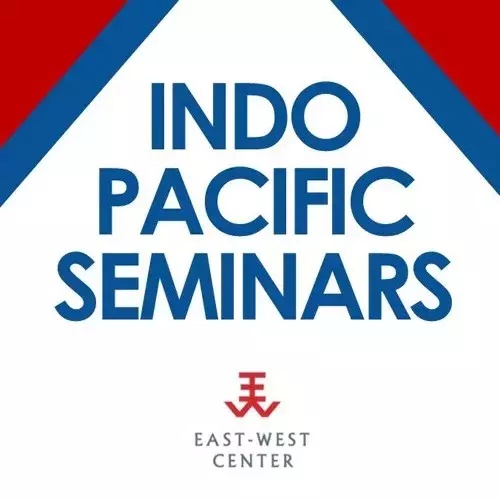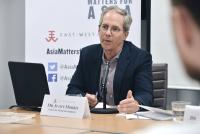Error message

OFFICE/DEPARTMENT
Is the BRI Sustainable? Evidence from the Kunming-Vientiane Railway and Beyond
An Indo-Pacific Political Economy and Trade Seminar featuring:
Mr. Scott Morris
Senior Fellow, Center for Global Development &
Director, US Development Policy Initiative
Dr. Satu P. Limaye (Moderator)
Vice President, East-West Center & Director, East West Center in Washington
The Kunming-Vientiane (K-V) railway, part of the Kunming-Singapore multi-country rail network (or “Pan-Asia Railway”), is an anchor investment of the Chinese government’s Belt and Road initiative (BRI). Morris’ case study assesses the rail project

along four dimensions: economic implications; procurement arrangements; labor; and environmental and social safeguards. In each of these areas, evidence from the railway project suggests that Chinese policy and practice could be better aligned with the practices of other sources of multilateral and bilateral development finance. Where the project’s standards are broadly aligned, at least in principle, there is nonetheless reason to believe that China’s approach carries heightened risks given the overall scale of financing.
These risks hold for China’s global program of official finance, which has made the country the largest source of official credit in the world. Mr. Morris discussed how BRI policymakers should consider a more rigorous set of “best practices” that align Chinese official finance with leading multilateral standards, even if these practices don’t currently characterize many other bilateral lenders. Such an approach would be consistent with the multilateral vision for BRI espoused by Chinese officials and would better ensure sustainability in BRI.
For more images, please visit the album for this event on the East-West Center's Flickr page.
SPEAKER BIOGRAPHIES
Scott Morris is a Senior Fellow at the Center for Global Development and Director of the US Development Policy Initiative. In addition to managing the Center’s work on US development policy, his research addresses development finance issues, debt policy, governance issues at international financial institutions like the World Bank and IMF, and China’s role as a development actor. Previously, Morris served as Deputy Assistant Secretary for Development Finance and Debt at the US Treasury Department during the first term of the Obama Administration. In that capacity, he led US engagement with the multilateral development banks, as well as US participation in the Paris Club of official creditors. During his time at Treasury, Morris led negotiations for four general capital increases at the multilateral development banks and replenishments of the International Development Association (IDA), Asian Development Fund, and African Development Fund. Morris also served as Senior Staff Member on the Financial Services Committee in the US House of Representatives, where he was responsible for the Committee’s international policy issues.
Satu Limaye is Vice President of the East-West Center and the Director of the East-West Center in Washington where he created and now directs the Asia Matters for America initiative and edits the Asia Pacific Bulletin. He is also a Senior Advisor at CNA Corp (Center for Naval Analyses) and Senior Fellow on Asia History and Policy at the Foreign Policy Institute at Paul H. Nitze School of International Studies (SAIS). He is a magna cum laude and Phi Beta Kappa graduate of Georgetown University and received his doctorate from Oxford University (Magdalen College) where he was a George C. Marshall Scholar. Dr. Limaye publishes and presents on a range of Indo-Pacific issues. Recent publications include: Raging Waters: China, India, Bangladesh and Brahmaputra River Politics (with Nilanthi Samaranayake and Joel Wuthnow); Why ASEAN is Here to Stay and What that Means for the US; The United States-Japan Alliance and Southeast Asia: Meeting Regional Demands; and Weighted West: The Indian Navy’s New Maritime Strategy, Capabilities, and Diplomacy.
Is the BRI Sustainable? Evidence from the Kunming-Vientiane Railway and Beyond
An Indo-Pacific Political Economy and Trade Seminar featuring:
Mr. Scott Morris
Senior Fellow, Center for Global Development &
Director, US Development Policy Initiative
Dr. Satu P. Limaye (Moderator)
Vice President, East-West Center & Director, East West Center in Washington
The Kunming-Vientiane (K-V) railway, part of the Kunming-Singapore multi-country rail network (or “Pan-Asia Railway”), is an anchor investment of the Chinese government’s Belt and Road initiative (BRI). Morris’ case study assesses the rail project

along four dimensions: economic implications; procurement arrangements; labor; and environmental and social safeguards. In each of these areas, evidence from the railway project suggests that Chinese policy and practice could be better aligned with the practices of other sources of multilateral and bilateral development finance. Where the project’s standards are broadly aligned, at least in principle, there is nonetheless reason to believe that China’s approach carries heightened risks given the overall scale of financing.
These risks hold for China’s global program of official finance, which has made the country the largest source of official credit in the world. Mr. Morris discussed how BRI policymakers should consider a more rigorous set of “best practices” that align Chinese official finance with leading multilateral standards, even if these practices don’t currently characterize many other bilateral lenders. Such an approach would be consistent with the multilateral vision for BRI espoused by Chinese officials and would better ensure sustainability in BRI.
For more images, please visit the album for this event on the East-West Center's Flickr page.
SPEAKER BIOGRAPHIES
Scott Morris is a Senior Fellow at the Center for Global Development and Director of the US Development Policy Initiative. In addition to managing the Center’s work on US development policy, his research addresses development finance issues, debt policy, governance issues at international financial institutions like the World Bank and IMF, and China’s role as a development actor. Previously, Morris served as Deputy Assistant Secretary for Development Finance and Debt at the US Treasury Department during the first term of the Obama Administration. In that capacity, he led US engagement with the multilateral development banks, as well as US participation in the Paris Club of official creditors. During his time at Treasury, Morris led negotiations for four general capital increases at the multilateral development banks and replenishments of the International Development Association (IDA), Asian Development Fund, and African Development Fund. Morris also served as Senior Staff Member on the Financial Services Committee in the US House of Representatives, where he was responsible for the Committee’s international policy issues.
Satu Limaye is Vice President of the East-West Center and the Director of the East-West Center in Washington where he created and now directs the Asia Matters for America initiative and edits the Asia Pacific Bulletin. He is also a Senior Advisor at CNA Corp (Center for Naval Analyses) and Senior Fellow on Asia History and Policy at the Foreign Policy Institute at Paul H. Nitze School of International Studies (SAIS). He is a magna cum laude and Phi Beta Kappa graduate of Georgetown University and received his doctorate from Oxford University (Magdalen College) where he was a George C. Marshall Scholar. Dr. Limaye publishes and presents on a range of Indo-Pacific issues. Recent publications include: Raging Waters: China, India, Bangladesh and Brahmaputra River Politics (with Nilanthi Samaranayake and Joel Wuthnow); Why ASEAN is Here to Stay and What that Means for the US; The United States-Japan Alliance and Southeast Asia: Meeting Regional Demands; and Weighted West: The Indian Navy’s New Maritime Strategy, Capabilities, and Diplomacy.









